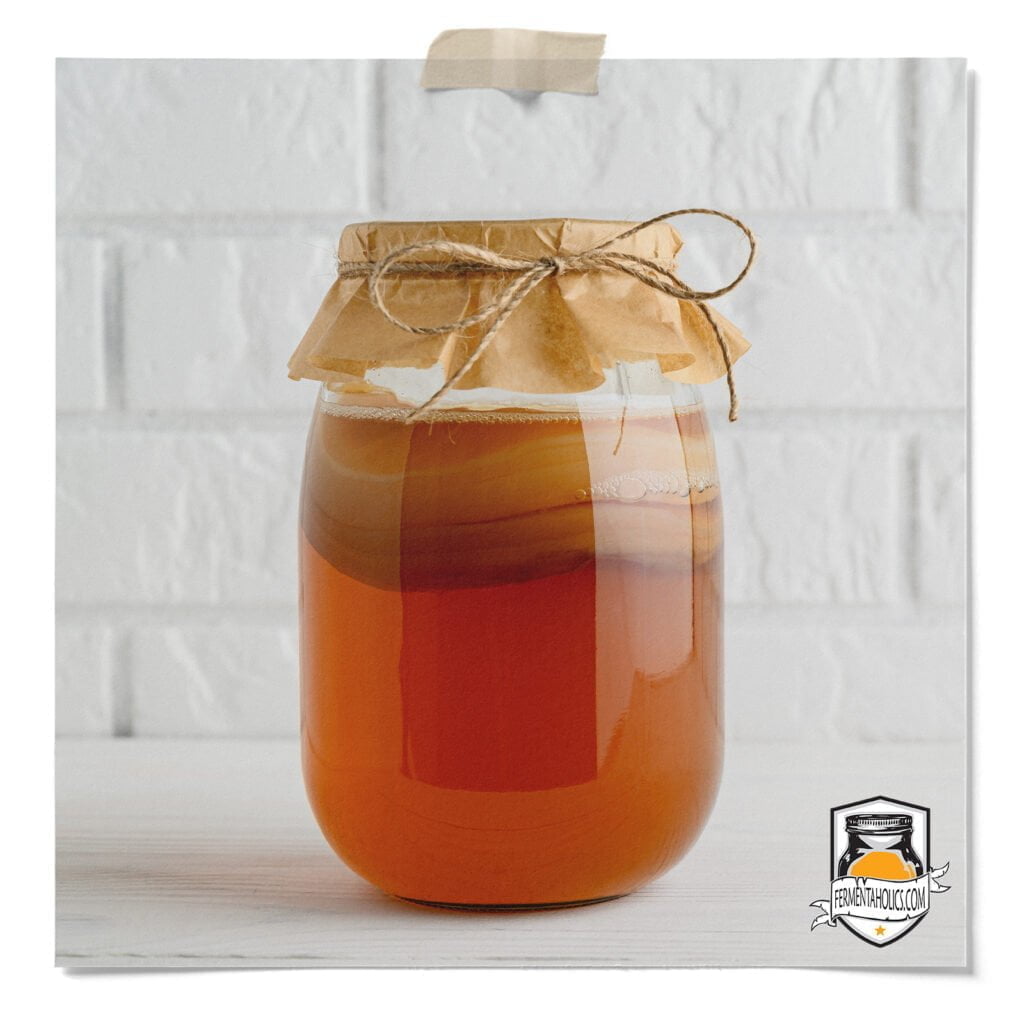
It depends. The answer will vary depending on whether you’re asking about store-bought or homemade kombucha. We’ll cover both. So let’s get started with whether or not you need to refrigerate store-bought kombucha.
Raw kombucha? Yes, it needs to be refrigerated and kept cold even before opening. Treat it with the same respect we give milk.
Pasteurized kombucha is shelf-stable and can kombucha be stored at room temperature. It will only need to be kept refrigerated after the bottle has been opened. Pasteurization is a process that uses heat to kill microbes in food products to increase their shelf life. This is a good thing for killing harmful bacteria. The problem is, pasteurization also kills beneficial bacteria and yeast found in kombucha. By removing the living bacteria, it eliminates the health benefits provided by drinking kombucha. Knowing this, some kombucha manufacturers have then added probiotics back into the kombucha after being pasteurized.
When it comes to homemade kombucha, we get asked about refrigeration on each step of the brewing process. The four main stages consist of storing your SCOBY, primary fermentation, secondary fermentation, and finished kombucha.
Your kombucha culture or SCOBY is shelf-stable, so it doesn’t require refrigeration. If you just bought a SCOBY, It’s best to keep it at room temperature until you are ready to brew. If you are in-between brews, just store it in a jar with a cloth cover much the same as your primary fermentation. This is the same idea as a SCOBY hotel.
Related Post: How to Make a SCOBY Hotel
To be thorough, the first fermentation and secondary fermentation are never refrigerated. The optimum temperature for brewing kombucha is between 75-85°F. The kombucha culture will slow as the temperature drops and evenly to a halt when you put it in the fridge. This is called hibernation or dormancy, in the brewing industry. So unless you want to stop fermentation, do not refrigerate.
Once your kombucha has finished the fermentation process and bottled, it is finished. Now, we will treat our homemade kombucha the same as raw kombucha, as that is what we have. So we want to make sure we store it in the fridge to stop further fermentation. Leaving raw homemade kombucha at room temperature in a sealed bottle is a bad idea. It allows your kombucha to continue to ferment at room temperature, and again when this occurs in a sealed bottle, it can and will eventually explode. So get it in the fridge.

Yes, once kombucha has finished fermenting and is ready for consumption, it should be refrigerated. Refrigeration slows down the fermentation process and helps maintain its flavor and carbonation.
If kombucha isn’t refrigerated after the fermentation process, it can continue to ferment. This can lead to a change in taste, making it too sour or fizzy, and in some cases, it can cause the bottle to explode due to the buildup of carbon dioxide.
If kombucha is left at room temperature after it’s ready, the yeast and bacteria in the drink will continue to ferment the sugars, which could lead to an overly sour taste like a vinegar.
The optimal temperature for storing ready-to-drink kombucha is typically the same as your refrigerator temperature, which is usually around 38-40°F (3-4°C).
Kombucha, when properly stored in the refrigerator, will last for months.
No, refrigeration does not kill the probiotics in kombucha.
When it’s ready to be refrigerated, kombucha should have a balanced taste – not too sweet, not too sour, and slightly fizzy.
While the fermentation process significantly slows down in the refrigerator, it does not completely stop. However, the slowed fermentation in the refrigerator is typically negligible and won’t noticeably affect the taste or texture.
Yes, kombucha should be stored in a sealed container when refrigerated to maintain its carbonation and to prevent it from absorbing odors from other foods in the refrigerator.
No, the cold temperature will halt fermentation. This is the active fermentation phase and it should be kept between 75-85°F.
The best way to slow down the fermentation process of kombucha is to refrigerate it. The cold temperature slows down the activity of the yeast and bacteria, preserving the kombucha’s flavor and carbonation.
